Shortcuts:.
Back to Cyberspace Communications
More Cyberspace Communications Topics:

Importance of Being Anonymous
Betty's blog archives.
Hint Sheet:.
Netiquette Quiz:.
Are you a good Cyber Citizen? Take Betty's Quiz to test your netiquette know-how:
Mobile Devices:.
Since you can easily take your mobile devices out in public, there's a few things you should keep in mind when using them:

Don't Share Your Private Conversations
When you're on a cell phone in public, keep in mind that there are people around you and they can hear what you are saying. Keep your voice down low and leave the room if you can.

Don't Disturb Others
When you are somewhere quiet, like a movie theater or a library, silence your phone's ringer to avoid disturbing other people. If you are somewhere dark, try to avoid using your phone at all unless you want it to shine like a lighthouse.

Don't Be Distracted
It's extremely dangerous to use a mobile device while driving and illegal in many states. More car accidents are caused each year by distracted drivers, and even distracted pedestrians can get hurt! If you need to send a text or make a phone call, be safe and stop moving first.
Online communication can be tricky. Sometimes itís hard to know exactly what the other person means without being able to see them or hear them. Here's some tips for being a good cyber citizen and having good manners.
Ask Permission
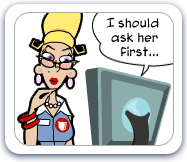
Ask someone's permission before posting anything about them on the Web or sharing their emails, photo, or chat conversations. You need to make sure they know you are sharing it and are okay with it.
If your friend gives you permission to forward something, be sure to protect them by removing any personal information like their name and email address, and remove any parts that have nothing to do with what you want to share.
Also, double-check the list of people you are forwarding the message to make sure no one is on it who shouldn't be. This is especially important in the business world because lots of very sensitive information is sent through email. You could lose your job if you accidentally forward some information to someone who wasn't supposed to know about it!
Be the Better Person
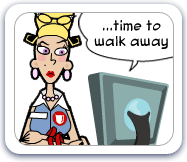
For some people, being anonymous in cyberspace becomes an excuse to behave rudely towards others. If they don’t know who you are, it’s okay to be mean to them, right? Wrong.
There will always be people who don’t respect others, and cyberspace can bring out the worst in them. Your email inbox might become flooded with spam or you might receive a nasty email from someone you thought was a friend. You might become the target of a cyber bully or have to deal with flaming on a forum or social networking site.
The best thing to do as a good cyber citizen is to Be the Better Person. If someone is being rude in cyberspace, you have a choice between joining in and making it worse or just walking away from it. If their attacks are directed at you, you can block them and talk to a trusted adult about how to best deal with them before responding.
Sometimes honest mistakes do happen, even between friends. If that's the case, you can talk about it and work out an understanding. As a good cyber citizen, you should help others out and always remember that there is a person with feelings behind that computer.
Pay Attention to Format
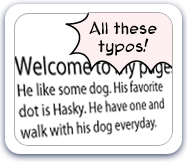
The Internet can be a very informal environment, but that's no excuse not to pay attention to the format of your emails, chat messages and online posts, just like you would if you were sending your grandmother a nice letter. Here are some formatting tips:
- Don't write a whole novel if you really have just a few things to say. Most people receive tons of email and text messages and having to read through a really lengthy one can waste their time. Keep it short, polite and to the point.
- Pay attention to the overall tone of your message. What you might intend as lighthearted teasing may actually come across as being mean. You can use emoticons and acronyms to help get your message across in the right spirit, since the recipient can’t see you face-to-face. Avoid using ALL CAPS in your message, in cyberspace it means you are shouting and is very rude.
- Always check what you have written for typos or other mistakes. Sloppy writing reflects very poorly on you and with the abundance of grammar and spell-check features out there, there is no excuse for having typos. Just spend a little bit of time reading your message over before clicking Send.
- Emails should be formatted just like a letter, beginning with addressing the recipient ("Dear Officer Ward," or "Ms. Adelaide,") and ending with a signature ("Sincerely, Betty," or "Love, Grandma"). If it's part of a long email conversation it's okay to relax the format a little though, but initial messages should be properly formatted.
- Make sure the subject line of an email is something that makes sense so the recipient knows what the email is about, especially if it's about something important. Confusing subject lines will probably just frustrate and annoy the recipient, and then they might not even read the email.
When you communicate face to face, facial expressions, body language, gestures and even the way you say things all combine to get your message across. Since you can't see people face to face in cyberspace, you're not getting the whole picture unless you adapt how you communicate.
Emoticons and acronyms can help you communicate better with people in cyberspace. There are other ways of emphasizing your words when you type, like making them bold, italicized or by putting them between special characters like *asterisks*. You can also use colloquialisms, expressions like "dude" and "whatever" that you probably use all the time when you talk to people, to help you type like you talk so that less gets lost in translation.
Internet Chat Slang
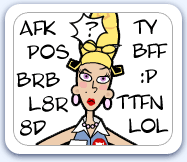
Many people use chat slang to save time and show emotions. However, it can be frustrating and embarrassing when someone doesn't understand it. A good cyber citizen is sensitive to other people's feelings and expertise and communicates in a way they will understand:
Acronyms
Acronyms like BRB, LOL, and FYI are abbreviated versions of phrases like Be Right Back, Laugh Out Loud, and For Your Information. They are much faster than typing out the entire phrase, and can be very useful when text messaging. You can find a list of common Web Acronyms here.
Emoticons
Emoticons, from the words "emotion" and "icon", are facial expressions or other pictures created with letters and punctuation symbols. Many emoticons, like :-) and >:-( are meant to be read sideways, and can be a fun way to show people your facial expressions when chatting. You can find a list of common Emoticons here, including a rose @--/-- and a cup of coffee c["].
L33tspeak
L33tspeak is a type of chat slang that is commonly used among gamers. The term comes from the word "elite" and is a way of writing by replacing alphabet letters with numbers and combinations of characters. It can also be further distorted through intentional bad spelling and poor grammar, so the phrase "1 4m l33t" stands for "I am elite." There are words and phrases unique to l33tspeak such as w00t, which is used for celebration, like "yay", and n00b, which means "newbie" and is a term from someone who is new to something or not very good at it. You can learn more about l33tspeak here.
Online Gaming Netiquette
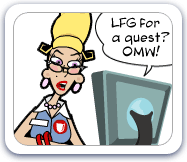
Many online multiplayer games allow you to chat with the other players. Just like any chatting in cyberspace, you should follow good Netiquette when doing so:
- Be polite - No one wants to play with a rude or annoying person. If you need help, ask politely and don't forget to say please and thank you.
- Communicate clearly - Especially when you are playing in a group, make sure everyone is ready before jumping into action. Mistakes can happen, but if you screw up, apologize.
- Learn the terminology - Online games have their own chat slang, like using AFK for Away From Keyboard and OMW for On My Way. Make an effort to learn the language so that you understand and can join in.
- Don't spam - Spamming in an online game is when you send multiple messages or invitations, one right after the other. This is annoying and clutters up the chat window. Don't keep sending invites if they get turned down and use private messages if you want to talk to someone.
- Don't be a griefer - Griefers are the cyber bullies of online games. If you are being bullied by someone in a game, ignore them or report them to the game moderators.
- Play fair - Don't try to cheat other players and don't use hacking software to cheat the game. Not only is it unfair, but it violates the Terms of Use and you can get banned from the game.
- Help out the new players - You were a new player, too, once. Be helpful to new players and show them the ropes, you may even make a friend!
- Don't tell other people how to play - Even if you've been playing for a long time and you think a player is doing something "wrong," unless they ask for help or are causing problems for you, keep it to yourself.
- Don't be a bad sport - Remember, it's just a game. Sometimes online games can get very frustrating, but don't let it ruin your day. If something is really making you upset, log off and go do something else.
Respect the Terms of Use
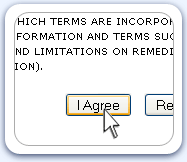
The Terms of Use are a list of guidelines given by a company that provides a service, such as a social networking site or an online game. These guidelines are meant to inform you of what behaviors will get your account banned from the site or game, such as cyber bullying, posting forbidden content or using a fake identity to create your account.
Many sites and game require you to agree to their Terms of Use when you create an account with them. Be sure to read through them with a trusted adult and make sure you understand what the rules are before you click the "I Agree" button.
The Terms of Use can also be used to protect the service provider from lawsuits. For example, if someone used a social networking site to harass or cyber stalk someone and their Terms of Use made it clear that harassing or stalking a user is not allowed, then the weirdo stalker violated the Terms of Use and the site would not be held responsible for their behavior.

